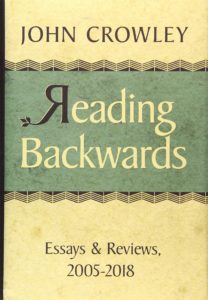There are still 148 copies available of this gorgeous, autographed collection of John Crowley reviews from 2005 to 2018. It’s a lovely object, a reminder of what the making of books, even commercially published books, can be as a craft. I’m even a little sorry that the dust jacket betrays that this book has actually been read, not just admired. Only a little bit, though, because otherwise what’s the point?
In contrast to the book’s title, I read it forwards and — unusually for me and a collection of essays or stories — straight through. (I know that authors construct their collections with care, but that’s not how my magpie mind works.) Crowley has divided Reading Backwards into three parts, with a couple of extra appendages at the beginning and end. The first is “A Voice from the Easy Chair,” essays from his time as a columnist for Harper’s Magazine. The second, “Fictional Voices” collects Crowley’s reviews, which are mainly but not exclusively about authors who write science fiction and fantasy. The third, “Looking Outward, Looking In” is more miscellaneous, more wide-ranging, and not constrained by the lengths of a particular column. I would have enjoyed knowing when and where all of the pieces were published, just to have a bit more context; these are occasional pieces, and sometimes it’s nice to know the occasion.
I most enjoyed the book reviews, not least because he has personal connections with several of the authors he considered, and those connections enrich his writings about the authors’ books. “A Postcard from Ursula” is only glancingly about her books and prowess as an author, more about her generosity in replying to his request for a blurb for his very first novel, back in 1973. “As a whole, the effect was a welcome into the fold, proffered to me by her.” (p. 115) He never forgot, and the esteem he held her work in made her welcome all the more beloved. Crowley offers a deep and careful look into Paul Park’s extraordinary four-volume fantasy story, A Princess of Roumania. It’s a portal fantasy, but one in which the world in which I am presently writing is the fantastic one, and the protagonist returns to the real one with Great Roumania as the pre-eminent power in Europe and the world’s highest technology is developed in Abyssinia. Crowley links it to All Those Vanished Engines, which he liked much better than I did; where he saw interesting metafiction, I saw author insertion descending toward solipsism. Crowley’s tribute to Thomas M. Disch (as he was called on the covers of most of his books) is a loving and clear look at Disch as a poet and prose writer, someone who did great but unremunerative work, someone who in a less cliqueish literary world might have been a household name, but who was also not always easy to get along with. Crowley suggests that gay marriage rights might have extended Disch’s life, and it’s certainly worth considering how much the difficulties of being openly gay in the mid-20th century, even in New York City, weighed on him. Crowley has a fondness for neglected writers of historical fiction, and his reviews of works by Leslie Epstein, David Stacton, Richard Hughes and others opened new vistas for me, whether or not I ever read any of those books. I love the title of a biography of Edward Gorey — “Born to be Posthumous” — and Crowley’s review rises to the same level.
The essays included in Reading Backwards range widely, marked by Crowley’s characteristic level-headedness and equanimity, even on subjects — one of his children’s disability, for example — that would draw much more heat from other writers. It’s not surprising that there are numerous reflections on death in this volume. Crowley will turn 80 later in 2022. Here is a bit where he considers Giordano Bruno and Montaigne, among other things:
There are laughing philosophers and dry-eyed philosophers and gloomy philosophers. In their almost entirely opposite ways, Montaigne and Bruno were laughers—not laughing in scorn or indifference but in the delight of understanding. My friend even as he was dying of cancer remained delighted by himself and those he loved, unable to get into death, though knowing he must. Bruno’s conclusions about infinities and eternities, the stars like a jeweled bracelet in the hand, were doubtless affected by his desires—as no doubt are mine. I can’t say for sure if his understanding of the universe supported him as he went to his death; and I don’t know if my conception will help me at the same crossroads. (p. 352)
The best of those reflections is “Works of Mercy,” which considers hospitals, sickness, history, death, profit, human care and human connection. It contains no set answers and many hard questions, but it opens possibilities even amid the finality of death.
As an essayist, Crowley revels in his own quirks. He talks about a theory of predicting the future that he came up with in the late 1960s while terribly stoned. He writes about Jack Womack’s Flying Saucers Are Real! by way of considering odd corners of modern life — there’s also a long essay in Reading Backwards about Madame Blavatsky and Theosophy — and his own encounters with the not always explicable. He clearly enjoyed H.G. Wells getting salty about the movie Metropolis.
I love Crowley’s earliest novels, though I have been a bit hit and miss with his work this century. The Translator is lovely; I have been unable to bother with the final volume of Aegypt. I am about halfway through Four Freedoms and have been for a couple of years now. Reading Backwards is a splendid companion to his fiction, a collection of how he sees things, a chance to encounter him engaging with the mundane world using all the power that he usually reserves for imagination.

